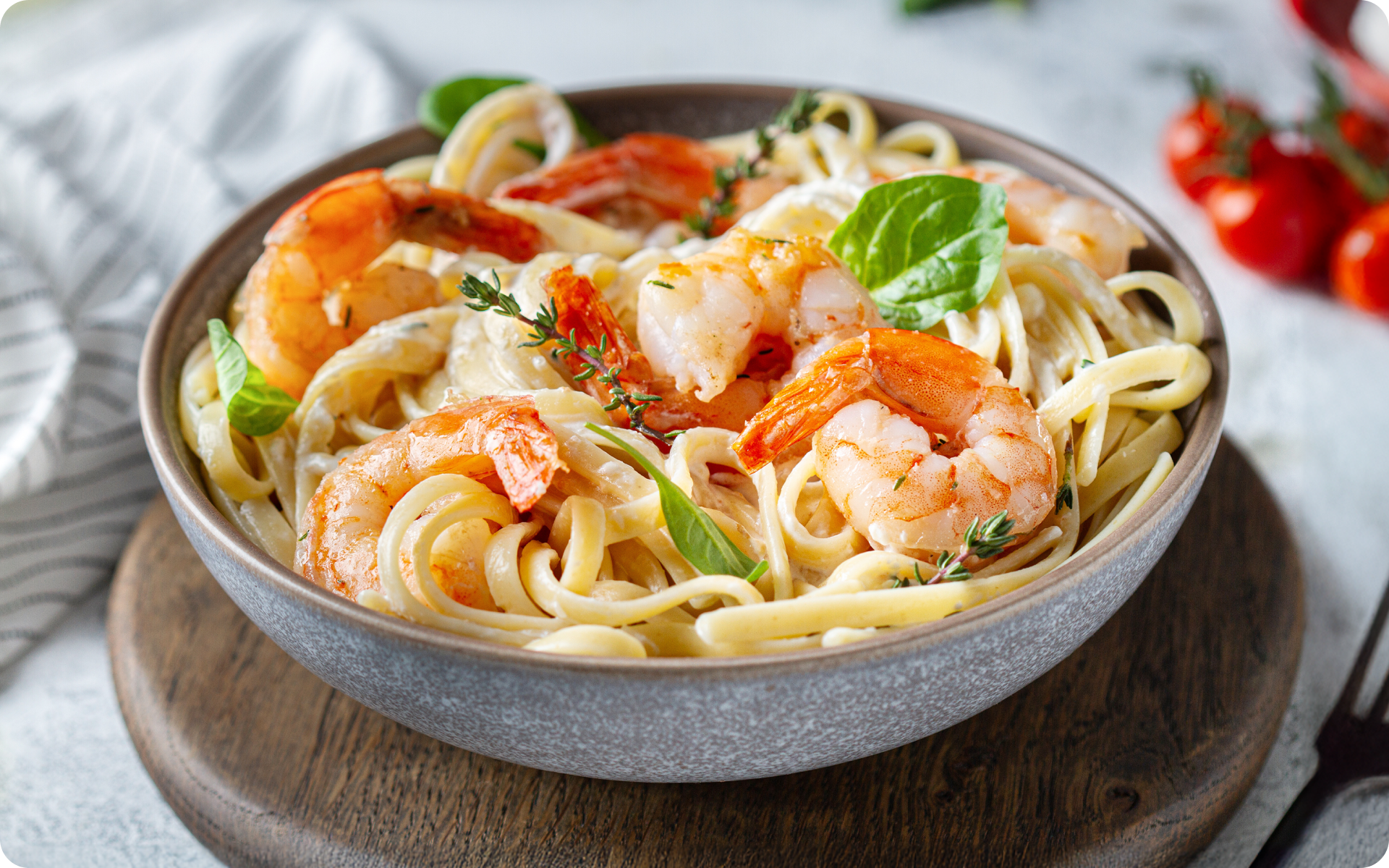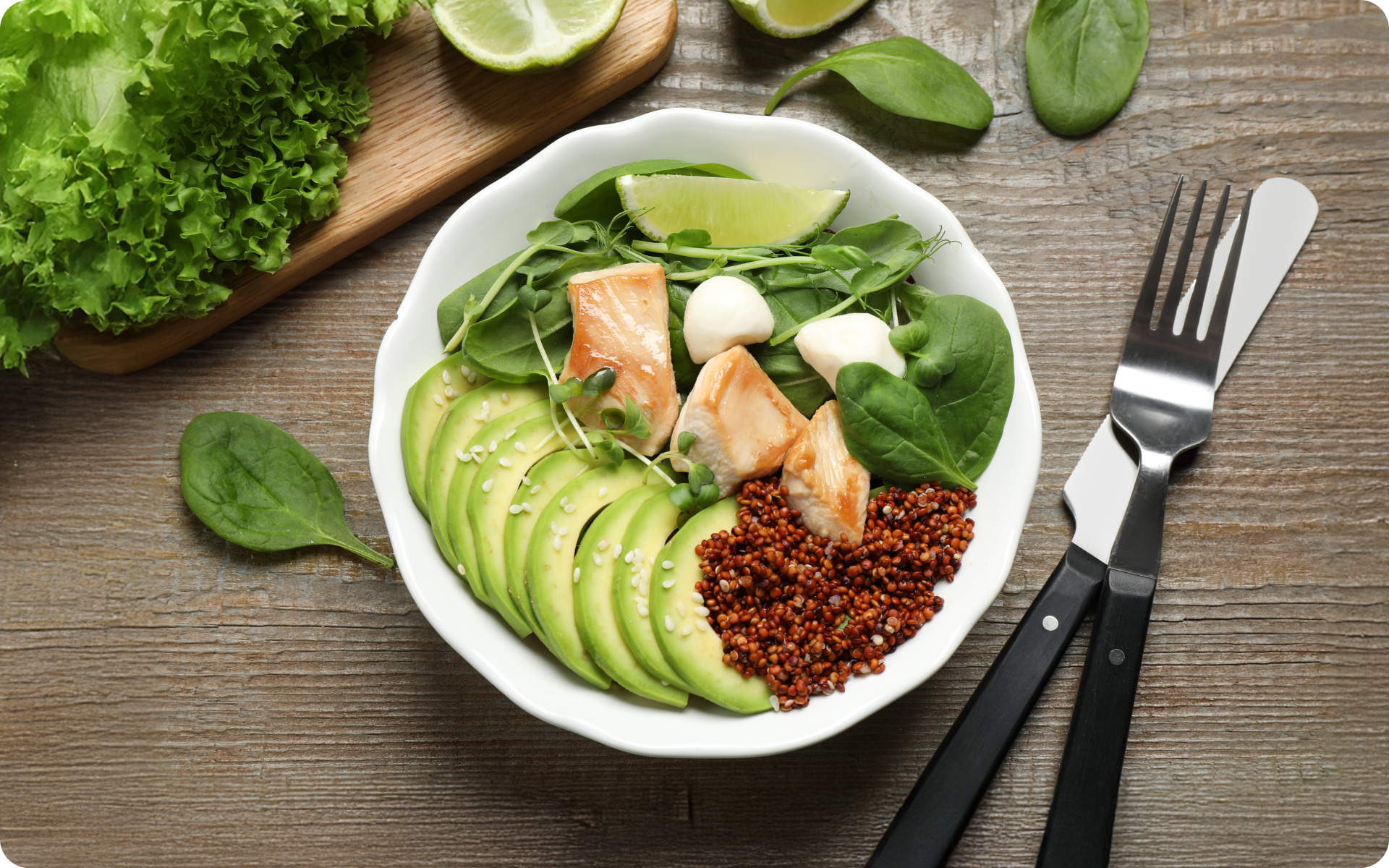The Mediterranean diet is known for its health benefits, including reducing the risk of heart disease, type 2 diabetes, and other chronic diseases (12). However, to reap these benefits, it’s important to understand the macronutrient breakdown of this eating pattern.
Macronutrients, or macros for short, refer to the three main components that make up our diet: carbohydrates, protein, and fat. Each of these macros serves a specific purpose in the body and is essential for optimal health.
In the Mediterranean diet, the recommended macro breakdown is as follows (13):
- Carbohydrates: 45-65% of daily calories
- Protein: 10-35% of daily calories
- Fat: 20-35% of daily calories
It’s important to note that this breakdown may vary slightly depending on individual needs and preferences. For example, someone who is more physically active may require a higher percentage of protein in their diet.
But why are these macros important and what foods should you eat to meet these recommendations?
What Are Macros?
Macros are the main components of our diet that provide energy and support various bodily functions. Broadly, carbohydrates provide us with energy, protein helps build and repair tissues, and fat plays a role in hormone production and nutrient absorption. Each of these macros serves a specific purpose, but it’s important to strike a balance between them (21).
Carbohydrates
In the Mediterranean diet, carbohydrates mainly come from whole grains, fruits, vegetables, and legumes. These complex carbohydrates provide a steady source of energy and are also rich in fiber, vitamins, and minerals (5). Whole grains such as quinoa, brown rice, and whole-wheat pasta are great options to include in your meals (22).
Protein
Protein is essential for building and repairing tissues in the body. Protein sources in the Mediterranean diet include fish, poultry, legumes, and dairy products. Fish such as salmon, tuna, and sardines are rich in heart-healthy omega-3 fatty acids. Legumes such as beans, lentils, and chickpeas are also excellent sources of protein and fiber that feature heavily in the Mediterranean diet (17).
Betterme will keep you laser-focused on your weight loss journey! Nutrient-packed meal plans, fat-blasting workouts, galvanizing challenges and much more. Try using the app and see for yourself!
Fat
The Mediterranean diet emphasizes healthy fats such as olive oil, nuts, seeds, and avocados (7). These sources of fat provide essential fatty acids and are also rich in antioxidants. Olive oil is a staple in the Mediterranean diet and is used for cooking and dressing salads. Nuts and seeds make excellent snacks or additions to meals, providing protein, healthy fats, and other important nutrients.
In addition to these main macros, the Mediterranean diet includes moderate amounts of dairy, eggs, and red wine (16). These foods provide additional nutrients and can be enjoyed in moderation to fit within the recommended macro breakdown.
When you follow the Mediterranean diet, it’s also important to limit ultra-processed foods, added sugars, and saturated fats. They should be consumed sparingly in order to maintain a healthy balance of macros.
The Mediterranean Diet Pyramid is a helpful visual representation of the recommended foods and proportions in this eating pattern. It emphasizes whole, nutritious foods such as fruits, vegetables, legumes, and whole grains at the base of the pyramid, with moderate amounts of seafood, poultry, eggs, and dairy in the middle layers and red meat and sweets at the top.
What Is the Healthiest Macro Ratio?
The recommended macro breakdown in the Mediterranean diet is a fairly wide range based on scientific research that meets the nutritional needs of most people. However, it’s important to note that there is no “perfect” macro ratio that’s suitable for everyone. Different individuals may require different ratios depending on factors such as age, sex, activity level, and specific health goals.
Ultimately, the healthiest macro ratio is one that’s balanced and customized to suit your individual needs and preferences. For example, someone who is looking to build muscle may require a higher percentage of protein in their diet, whereas someone who is looking to lose weight may benefit from a slightly lower carbohydrate intake.
It’s also important to remember that the quality of food matters as much as the quantity. In other words, choosing nutrient-dense foods is more important than strict adherence to a certain macro ratio. So while it’s helpful to have a general guideline, it’s ultimately up to you to find what works best for your body and lifestyle.
How Do I Calculate My Macros?
To calculate your macros, you first need to determine your daily calorie needs. This can be done using an online calculator or by consulting a healthcare professional (3). Once you have your total daily calorie needs, you can use the recommended percentages for each macro to determine how much of each you should consume.
For example, if your daily calorie needs are 2,000 calories and you follow the recommended macro breakdown for the Mediterranean diet, your daily intake may look something like this:
- Carbohydrates: 2,000 calories x 50% = 1,000 calories / 4 calories per gram = 250 grams
- Protein: 2,000 calories x 20% = 400 calories / 4 calories per gram = 100 grams
- Fat: 2,000 calories x 30% = 600 calories / 9 calories per gram = 66.7 grams
You should keep in mind that this is just an example and your individual needs may vary.
Mediterranean Diet Macros for Weight Loss
The Mediterranean diet is known for its health benefits, but it has also been shown to be effective for weight loss when followed correctly. To lose weight on the Mediterranean diet, it’s important to maintain a calorie deficit while following the recommended macro breakdown.
This can be achieved by reducing portion sizes and choosing lower-calorie options in each food group. For example, instead of a large serving of pasta, you could opt for a smaller portion with more vegetables and lean protein. It’s also important to focus on nutrient-dense foods while limiting ultra-processed and high-calorie options.
Other efforts to help you lose weight when following the Mediterranean diet macros diet include:
- Be more active. In addition to filling up on grains and vegetables, you must be physically active. So, don’t sit around watching movies all day and try to incorporate daily walks or morning runs into your day. Squeeze any other activity that requires you to get up and about into your daily routine for maximum benefit.
- Don’t completely cut out your favorite foods. If you ban these foods, you’ll end up craving them. So, if you feel like eating something you truly enjoy, you should do so in moderation.
- Give alcohol a pass. Alcohol has many calories that may make you gain weight rather than lose it. The Mediterranean diet allows drinking in moderation, particularly red wine, but if you don’t currently drink, it’s neither required nor recommended to start. Moderation is typically defined as no more than one drink a day for women and two for men.
- Consider strength training. This will help you burn a lot of calories and gain muscle mass. Having more muscle burns more calories, even when you’re at rest.
- Drink a lot of water. Water contains no calories or added sugars. So, substitute all your go-to sweetened drinks and sodas with water. The results won’t keep you waiting.
- Incorporate intermittent fasting into your schedule. Fasting can help you limit your daily calorie intake. This should promote weight loss as your body burns stored fat to provide the needed energy. You should avoid any form of exercise during your fasting period and eat a light meal when breaking your fast to avoid indigestion.
Read more: 7-Day Weight Loss Low-Carb Diet: Choose High-Protein, High-Fiber, or Ultra-Low-Carb
Mediterranean Diet Meal Plan Including Daily Macros
Here’s a typical Mediterranean diet meal plan you can adopt:
Breakfast
- 1 slice whole-grain toast
- ½ mashed avocado
- 6 ounces low-fat Greek yogurt
- ½ cup strawberries
- 1 teaspoon honey
Lunch
- 1 medium-sized orange
- 1 cup water with a lemon wedge
- 1 whole-grain pita
- 2 tablespoons hummus
- 1 cup fresh greens
- 2 slices tomato
- 1 cup minestrone
Snack
- ⅛ cup peanuts
- ⅛ cup sliced almonds
Dinner
- 3 ounces salmon topped with 1 teaspoon tarragon
- 1 teaspoon mustard
- ½ cup couscous
- ½ cup zucchini
- 5 fluid ounces red wine
- 4 asparagus spears
For the salad:
- 1 cup arugula
- ½ cup baby spinach
- 1 tablespoon parmesan cheese
- 1 tablespoon vinaigrette dressing
Dessert
- 1 small bunch fresh grapes
- ½ cup lemon sorbet
There is a more extensive version of this in our blog post: Mediterranean Diet 30-Day Meal Plan.
What Foods Can’t You Eat on A Mediterranean Diet?
There is no food you can’t eat on a Mediterranean diet. However, here are some foods you should consume in limited portions:
- Cheese
- Yogurt
- Eggs
- Lean poultry
- Milk
- Wine
The following foods should be enjoyed occasionally or avoided completely:
- Sweets
- Processed and red meat
- Energy-dense animal-source products such as butter
Check out the Mediterranean Diet Food List on our blog for a more detailed look at what you can and can’t eat while you’re on the diet.
BetterMe app will kick you out of the mental funk, shake off your extra weight, rid you off your energy-zapping habits, and help you sculpt the body of your dreams. Intrigued? Hurry up and change your life for the better!
Benefits of the Mediterranean Diet
This diet has the following advantages:
It’s filling
The nutrient-dense foods that are incorporated in the diet keep you satisfied and full, particularly those that are high in fiber and/or protein. This will leave little room for other unhealthy deep-fried snacks and desserts that you may start craving when hunger hits.
If you’re trying to lose weight, this can help you eat less than your daily energy requirements and create a calorie deficit in your system. More fats will be burned to make up for the calorie deficit (1).
It’s adaptable
You don’t need to eat foods from the Mediterranean region. You can incorporate foods and flavors from your own country or your own personal preferences. It’s more about prioritizing certain food groups such as whole grains, fruits, vegetables, beans, and legumes, in addition to healthy fats and seafood in moderation. The exact dishes and flavors you create are up to your own imagination.
It’s enjoyable
The diet has endless delicious possibilities. The encouragement to up your healthy fat intake makes this diet all the more appealing.
It has various health benefits
The Mediterranean diet has been associated with various health benefits. The following studies are proof of this claim:
- A group of scientists from the University of Alabama, Harvard University, and Cornell’s Medical School conducted an analysis using data from a seven-year study of 3,562 subjects with heart disease. After investigating the subjects’ eating patterns, the researchers found that those who ate the closest to a Mediterranean diet had a lower risk of having a recurrent cardiovascular event, and were less likely to die of any cause(1).
- A 2019 review found that the Mediterranean diet could improve and help prevent metabolic syndrome (a group of risk factors for heart disease and diabetes) (12). They also found it to be effective in preventing obesity and increases in waist circumference, and that it may reduce mortality risk, type 2 diabetes, and heart disease risk. It can also benefit those who already have type 2 diabetes or heart disease.
- A study published in 2014 found that the Mediterranean diet may reduce the risk of breast cancer (19).
Cons of the Mediterranean Diet
The following are disadvantages of the meal plan:
- Lack of clear rules. There isn’t any type of food you absolutely can’t eat. Having this much freedom food-wise when you’re trying to lose weight can become a challenge if you’re the kind of person who needs specific guidance.
- You’ll miss your favorite foods. Steaks, French fries, and deep-fried chicken are off-limits. So, if you love any kind of ultra-processed or fried foods, following this diet may be quite a challenge for you, particularly if you have a sweet tooth.
- Plant-sourced oils. If you don’t like olives, canola, walnuts, and avocado oils, this diet won’t suit you (9).
Does the Mediterranean Diet Have Any Health Risks?
No, it’s unlikely that this meal plan will cause any health damage. As long as you have a sensible food plan and stick to it, there’s no need to worry about any risks. This approach is flexible and safe for anyone, including kids, adults, and seniors.
If you have any pre-existing health conditions, make sure you consult your doctor or dietitian before you make any major diet changes.
Read more: 24 Weight Loss Smoothies, 2 Diet Plans, and 5 Belly Fat Smoothie Secrets
FAQs
How much protein do I need on a Mediterranean diet?
You should aim for 10-35% of your daily calories to come from protein on the Mediterranean diet. You can also aim for approximately 0.8-1 gram of protein per kilogram of body weight. You may have higher protein needs if you fall into a high physical activity category or if you have specific goals such as building muscle (10).
Is the Mediterranean diet high in carbs?
The Mediterranean diet may be considered higher in carbs than other popular diets such as keto or paleo because it doesn’t restrict carbohydrate intake. The macro breakdown in the Mediterranean diet includes 45-65% of daily calories from carbohydrates, which is generally higher than most low-carb diets.
That being said, the carbohydrates in the Mediterranean diet are mainly from whole, nutrient-dense sources such as fruits, vegetables, and whole grains. These types of carbohydrates provide important nutrients and fiber.
They also have a lower glycemic index, which means they don’t spike blood sugar levels as much as refined carbohydrates. This makes them a healthier option for blood sugar control and weight management (4).
How many calories should I eat on a Mediterranean diet?
While you’re on the Mediterranean diet, you should follow a balanced meal plan that provides around 2,000 calories per day for women and 2,500 calories per day for men. Of course, individual needs may vary based on factors such as age, sex, activity level, and health goals. You can use an online calculator or consult a dietitian to determine your specific calorie needs (3).
Overall, the Mediterranean diet encourages mindful eating and listening to your body’s hunger and fullness cues rather than strict calorie-counting. This approach promotes a healthier relationship with food and can lead to long-term success in maintaining a healthy weight.
Is 35 grams of fat a day enough?
35 grams of fat per day is pretty low for most people. The recommended amount of fat in the Mediterranean diet is 20-35% of daily calorie intake, which varies depending on individual needs. If your calorie requirements are 2,000 per day, this equates to approximately 45-77 grams of fat per day.
The type of fat consumed is also important. The Mediterranean diet recommends consuming healthy fats such as olive oil, avocado, nuts, and seeds rather than saturated or trans fats. These healthier options provide essential fatty acids and have been linked to several health benefits such as improved heart health (7).
DISCLAIMER:
This article is intended for general informational purposes only and does not serve to address individual circumstances. It is not a substitute for professional advice or help and should not be relied on for making any kind of decision-making. Any action taken as a direct or indirect result of the information in this article is entirely at your own risk and is your sole responsibility.
BetterMe, its content staff, and its medical advisors accept no responsibility for inaccuracies, errors, misstatements, inconsistencies, or omissions and specifically disclaim any liability, loss or risk, personal, professional or otherwise, which may be incurred as a consequence, directly or indirectly, of the use and/or application of any content.
You should always seek the advice of your physician or other qualified health provider with any questions you may have regarding a medical condition or your specific situation. Never disregard professional medical advice or delay seeking it because of BetterMe content. If you suspect or think you may have a medical emergency, call your doctor.
SOURCES:
- Adopt a Mediterranean diet now for better health later (2013, health.harvard.edu)
- A practical guide to the Mediterranean diet (2019, health.harvard.edu)
- Body Weight Planner (n,d,nih.gov)
- Carbohydrates and the glycaemic index (2022,nih.gov)
- Complex carbohydrates (2022,nih.gov)
- Dietary Patterns and Mediterranean Diet Score and Hazard of Recurrent Coronary Heart Disease Events and All-Cause Mortality in the REGARDS Study (2018, pubmed.ncbi.nlm.nih.gov)
- Essentials of Healthy Eating: A Guide (2012, ncbi.nlm.nih.gov )
- Eating healthy fats has many benefits (2022,nih.gov)
- Everything you need to about the Mediterranean diet, according to a dietarian (2020, nbcnews.com)
- How much protein do you need every day? (2023,nih.gov)
- Low-carb and Mediterranean diets beat low-fat plans for losing weight – report (2015, theguardian.com)
- Mediterranean Diet and Cardiodiabesity: A Systematic Review through Evidence-Based Answers to Key Clinical Questions (2019, pubmed.ncbi.nlm.nih.gov)
- Mediterranean diet, micro- and macronutrients, and MRI measures of cortical thickness (2017, ncbi.nlm.nih.gov)
- Mediterranean diet quick start (2014, health.harvard.edu)
- Milk and dairy products: good or bad for human health? An assessment of the totality of scientific evidence (2016, ncbi.nlm.nih.gov)
- Our guide to the Mediterranean diet (2019, medicalnewstoday.com)
- Protein (2022,betterhealth.vic.gov.au)
- Seafood: nutritional benefits and risk aspects (2012, pubmed.ncbi.nlm.nih.gov)
- Spanish Mediterranean diet and other dietary patterns and breast cancer risk: case–control EpiGEICAM study (2014, ncbi.nlm.nih.gov)
- The Perfect Diet (2015, health.harvard.edu)
- What to know about macronutrients (2021,medicalnewstoday.com)
- Whole Grains Deliver on Health Benefits (2018,usda.gov)










